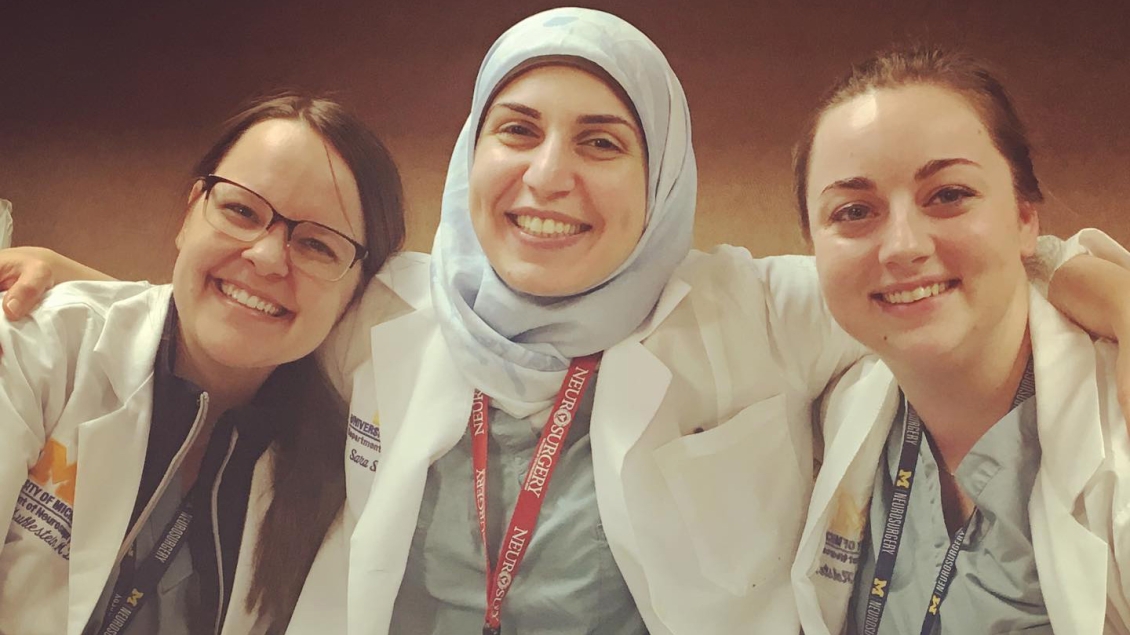
The U-M Medical School Department of Neurosurgery is committed to leadership in diversity, equity and inclusion. This commitment helps shape how we care for our patients, perform groundbreaking research, and recruit and educate tomorrow’s neurosurgical leaders.
As a Department, we uphold the Core Values of Michigan Medicine, and inherent in these values is the importance of diversity, equity, and inclusion. The core values are:
- Caring - We will treat everyone with dignity, kindness, and respect, promoting the well-being of self and others.
- Integrity - We will adhere to the highest ethical standards, demonstrating courage, truth, and transparency in our words and actions.
- Innovation - We will promote a culture of creativity, flexibility, and curiosity that inspires new ideas and ways of thinking, behaving and improving the world.
- Inclusion - We will foster an environment where every individual has a sense of belonging, a voice that is heard, and the opportunity to achieve and thrive.
- Teamwork - We will work together with a shared purpose rooted in equity and fairness where diversity is celebrated, respected and valued.

Our department has a long history of leadership in these areas. Some notable past members of the department include Latunde Odeku, Elizabeth Crosby (for whom our Crosby Neurosurgical Laboratories are named) and Joan Venes, a founding member of the American Society of Pediatric Neurosurgery, who became U-M’s first full-time pediatric neurosurgeon 1983. More recently, Karin Muraszko who served as our department chair from 2005 to 2022, was the first female chair of an academic neurosurgery department in the U.S.
In 2025, the first all-female cohort of residents - Drs. Katherine Holste, Whitney Muhlestein, and Sara Saleh - will matriculate. Their passion for medicine stems from a deep interest in caring for and improving the lives of patients with neurological illness. While their interests within neurosurgery vary widely (pediatrics, peripheral nerve and spine, and endoscopic skull base), their love for each other and ‘the sisterhood’ helps them to not only survive, but thrive, as women in surgery.

Latunde Odeku is the first African-American neurosurgeon trained in the United States and Africa’s first neurosurgeon, who completed his neurosurgical residency at U-M from 1954-1960

Elizabeth Crosby (for whom our Crosby Neurosurgical Laboratories are named) was the first woman to be promoted to full professor at the University of Michigan Medical School in 1936

Karin Muraszko who served as our department chair from 2005 to 2022, was the first female chair of an academic neurosurgery department in the U.S.
Our department is proud to have a strong legacy of diversity, equity, and inclusion and is steadfastly committed to continuously building upon this legacy as we move forward into the future.
Current diversity-related initiatives and policies in the department include but are not limited to:
- Diversity and Inclusion Committee
- Neurosurgery Resident Ombudspeople, who are selected by their resident peers
- Commitment to gender equity
- Commitment to a supportive environment for residents with children
- Support for residents who are nursing mothers
- The U-M Medical School Department of Neurosurgery enacted the “Wellness of Lactating Neurosurgical Residents” Policy in August 2018 in order to support the wellness of lactating surgical residents and to protect the health and wellbeing of our diverse resident group.
- Parental Leave Policy
- The University of Michigan’s parental leave policy enables residents to take six consecutive weeks of paid time off to bond with a newborn, newly adopted, or newly fostered child, or minor for whom legal guardianship has been newly appointed.
- Annual participation at SiMfest during the Student National Medical Association annual meeting
Our department is fortunate to be part of an institution that prioritizes diversity, equity and inclusion, and provides many valuable resources and opportunities to enhance our efforts in these areas.
The OHEI at Michigan Medicine develops mechanisms for inclusion, diversity and cultural sensitivity among faculty, students and staff. OHEI advances clinical care for under-served patient populations through research and education. OHEI's goal is to transform health care and ensure health care equity.